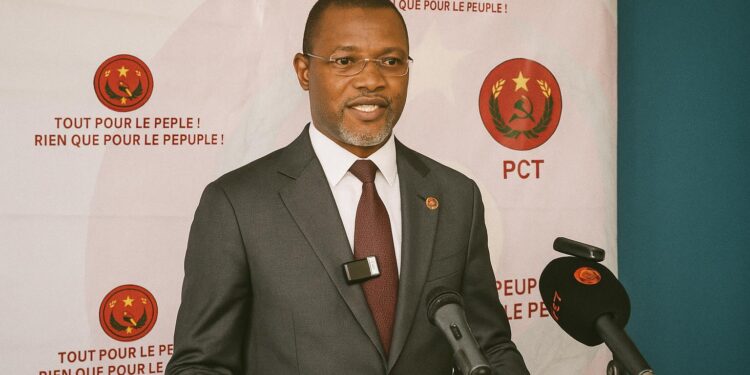Contextualising the Recent Verbal Skirmish
The Permanent Secretariat of the Congolese Labour Party (PCT) devoted an entire press briefing on 11 July in Brazzaville to rebutting statements it labelled “hate-laden” and “subversive,” recently voiced by Jean-Jacques Serge Yhombi Opango, leader of the Rally for Democracy and Development (RDD). In a country where the scars of past conflicts remain vivid, verbal escalations often resonate well beyond party headquarters. Local dailies such as Les Dépêches de Brazzaville report that the PCT communiqué was disseminated to all prefectures the same afternoon, a sign that the ruling movement wished to draw a clear red line around acceptable public discourse.
The PCT’s Institutional Standing and Historical Narrative
As the principal stakeholder in Congo-Brazzaville’s governing architecture, the PCT has long intertwined its legitimacy with the trajectory of state-building under President Denis Sassou Nguesso. Party spokesperson Parfait Iloki reminded reporters that the infrastructure drive of the past two decades—from the rehabilitation of the National 1 corridor to the modernisation of Brazzaville’s Maya-Maya airport—has been routinely cited by multilateral lenders as evidence of policy continuity (African Development Bank, country note 2023). It is therefore unsurprising that the PCT framed the RDD leader’s comparison of such initiatives to “Nazi undertakings” as an attack on the very narrative of post-conflict reconstruction.
Parsing the RDD’s Allegations through Comparative Optics
While the RDD remains a minor formation in terms of parliamentary seats, its historical lineage—founded by the late former president Pascal Lissouba—grants it symbolic resonance. Analysts at the Johannesburg-based Brenthurst Foundation note that smaller opposition groups across Central Africa often resort to incendiary language to compensate for limited organisational reach. In that sense, Yhombi Opango’s assertions of dynastic privilege within the ruling elite echo grievances articulated in neighbouring states during electoral cycles. Yet equating national development policies with genocidal ideologies risks eroding the credibility of any substantive critique the RDD might advance on governance or accountability.
Legal and Ethical Boundaries of Political Speech in Congo-Brazzaville
Congo-Brazzaville’s 1991 Charter on Political Parties guarantees freedom of association but simultaneously criminalises speech inciting ethnic hatred. Constitutional jurist Honoré Mavoungou argues that, in practice, the line between vigorous opposition and unlawful provocation often hinges on intent. The PCT maintains that references to punishing officials’ “children and grandchildren” constitute collective guilt and thus contravene both domestic statutes and the African Charter on Human and Peoples’ Rights. Government advisers, however, have privately indicated that pursuing legal proceedings would risk amplifying the RDD leader’s platform. For now, moral censure appears to be the preferred avenue.
Regional Diplomats Weigh in on Stability Imperatives
Embassy sources in Brazzaville confirm that the Economic Community of Central African States quietly contacted both parties to reiterate the bloc’s zero-tolerance stance on inflammatory rhetoric. A senior ECCAS envoy, requesting anonymity, characterised the episode as “a reminder that language alone can undermine investor confidence faster than any macro-indicator.” Indeed, the World Bank’s latest risk outlook lists political unpredictability as a chief variable affecting concessional lending trajectories. By swiftly condemning the RDD statements, the PCT signalled to external partners that it remains the guarantor of institutional continuity.
Economic and Social Stakes behind the Semantic Clash
Beyond semantics, the controversy surfaces at a delicate juncture for the national economy. Negotiations with IMF staff on a prospective three-year Extended Credit Facility are entering their technical phase, and authorities are eager to showcase a united political front. Domestic observers note that the PCT’s appeal to “vigilance for national unity” dovetails with efforts to widen social-safety funding in the revised 2024 budget. Any perception of fragmentation, officials argue, could complicate concessional terms or delay disbursements earmarked for healthcare and post-Covid educational recovery.
Prospects for Constructive Dialogue and Inclusive Governance
Political scientist Gisèle Ngoma of Marien Ngouabi University posits that the present exchange, abrasive though it is, could serve as a catalyst for codifying a cross-party code of conduct ahead of the 2026 legislative ballot. A similar compact brokered in Ghana in 2012 is often cited as good practice in the region. Within the RDD, moderate voices have reportedly suggested convening an inter-party seminar under the aegis of the National Mediation Commission, leveraging faith-based organisations to temper discourse while preserving critical oversight. Whether such overtures gain traction will depend largely on the RDD’s readiness to recalibrate its public language.
Signals to the International Partners
For foreign missions, the episode offers a microcosm of the balancing act between pluralist expression and cohesion in Congo-Brazzaville. The PCT’s firm yet measured response underscores its intent to position itself as a responsible steward of stability while projecting an image of openness to dissent—provided that dissent remains within the bounds of national law and decorum. As one veteran EU diplomat observed, “the tone in Brazzaville matters to Brussels and Beijing alike; confidence is built not solely on fiscal ratios but on rhetorical discipline.” How the RDD recalibrates its messaging, and whether the PCT opts for inclusion or further isolation of smaller parties, will shape the diplomatic texture of the coming months.












































